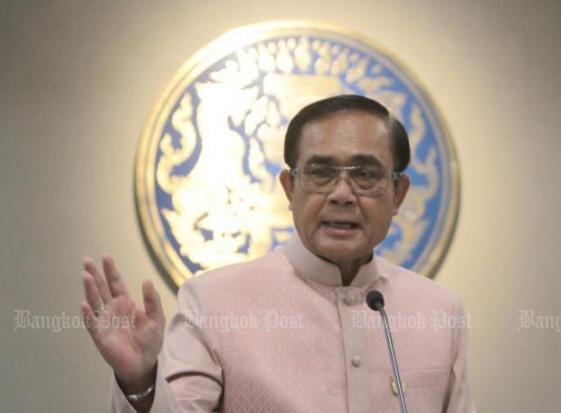PM plays down calls for national govt
published : 10 Apr 2019 at 11:36
writer: Gregory Morrissey
ORIGINAL SOURCE/WRITER: Post Reporters

Prime Minister Prayut Chan-o-cha has poured cold water on the idea of a national government to save the country from political deadlock.
Gen Prayut on Tuesday said the law must be studied carefully, but it would be premature to entertain the notion of a national government where there is no opposition.
"The process is far from over," he said, apparently referring to the pending announcement of the overall official results of the March 24 general election by the Election Commission (EC).
The EC has announced the constituency seat tally and released the number of votes that will be used to calculate the party-list seats. However, the commission has not divulged the exact number of list seats parties have won.
This delay has raised concerns of a political stalemate, especially now that no single bloc of parties appears able to clinch an outright majority.
Some politicians have suggested that a national government, where all parties come together to govern the country with no opposition, may be the way out.
"We don't even know if the idea is tenable. We need to look at what the law and the constitution say about it," the prime minister said.
"It's not as though everyone can set new rules as they go along. It's not a cure for everything," Gen Prayut added.
Meanwhile, Jade Donavanik, chairman of the Faculty of Law at the College of Asian Scholars, said that although the charter provides leeway for a national government to be established, it is difficult to put into practice.
"The political situation is not likely to escalate into an impasse that would warrant such a government being formed," said Mr Jade, who sat on the Constitution Drafting Committee.
Witthaya Kaewparadai, a key Democrat Party figure, said it is too early to discuss a national government as the election results are not yet final.
Suthin Klangsaeng, the Pheu Thai Party's MP-elect for Maha Sarakham, said the idea of a national government should not be ruled out as it could come in handy in a political crisis which might otherwise invite a military intervention.
Learn from listening
Vocabulary
- bloc: a group of people, countries, etc. who work closely together - กลุ่ม
- clinch (verb): to succeed in achieving or winning something - รัดแน่น, ตอกติด, ยึดติด
- come in handy: be useful - ที่มีประโยชน์,ซึ่งนำไปใช้ประโยชน์ได้
- constituency: a district that elects its own representative to parliament - เขตเลือกตั้ง
- deadlock: a situation in which neither person or group involved in a disagreement is willing to change their opinions or positions - หมดหนทาง ไม่มีทางแก้
- divulge: to give somebody information that is supposed to be secret - เปิดเผยความลับ
- entertain: consider doing something - พิจารณาลองทำบางสิ่ง
- impasse: a situation in which progress is not possible because none of the people involved are willing to change their decision - ทางตัน
- leeway: being able to move around and not be constrained in movement or action; an area or a place that is empty or that can be moved about freely; space - ที่ว่าง
- notion: belief or idea - ความคิด, ความเชื่อ, แนวคิด
- pending: waiting to be dealt with, settled or completed - ยังค้างอยู่, ซึ่งยังไม่จบสิ้น, อยู่ในระหว่าง
- pour cold water: to give reasons for not being in favour of something; to criticise something -
- premature: too soon to do something - ก่อนเวลา
- stalemate : a situation in which progress seems impossible because the people or groups involved cannot agree - การคุมเชิง การดูที่ท่าของทั้งสองฝ่าย
- tally: a record or count of a number of items - การบันทึกจำนวน
- tenable: (of a theory, an opinion, etc.) easy to defend against attack or criticism -
- warrant: to be/make necessary or appropriate in a particular situation - มีเหตุผลอันสมควร
